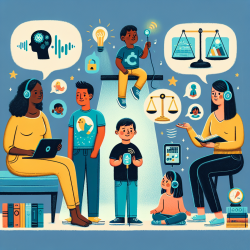In the world of speech-language pathology, ensuring that clients and their families fully understand the therapy process is crucial. This is especially true for online therapy services like those provided by TinyEYE. The research article "Optimizing the HIV/AIDS informed consent process in India" offers valuable insights that can be adapted to enhance informed consent in our field.
Why Informed Consent Matters
Informed consent is not just a formality; it’s a cornerstone of ethical practice. It ensures that clients and their families are fully aware of the therapy process, its benefits, and any potential risks. This transparency builds trust and promotes better therapeutic outcomes.
Key Findings from the Research
The study conducted in Maharashtra, India, revealed that using culturally appropriate visual aids significantly improved participants' understanding of informed consent. Here are some key outcomes:
- Overall understanding of informed consent issues increased from 38% to 72% with group counseling enhanced by visual aids.
- When these visuals were reinforced during individual counseling, comprehension rose to 96%.
Applying These Findings to Online Therapy
For practitioners at TinyEYE, these findings can be transformative. Here’s how we can implement similar strategies:
1. Use of Visual Aids
Integrate simple, culturally appropriate visuals in our online therapy sessions. These could include:
- Infographics explaining the therapy process
- Visual representations of expected outcomes
- Charts outlining potential risks and benefits
2. Enhanced Group and Individual Counseling
During initial consultations and throughout the therapy process, use visual aids to reinforce key points. This can be done through:
- Interactive webinars for groups of parents and caregivers
- One-on-one video calls where visuals are shared on screen
3. Continuous Evaluation and Improvement
Regularly assess the effectiveness of these visual aids and make adjustments based on feedback and data. This can include:
- Surveys to gauge understanding
- Follow-up interviews to identify areas needing improvement
Encouraging Further Research
While these strategies show promise, further research is essential to tailor these methods to the specific needs of our clients. Practitioners are encouraged to engage in or support studies that explore the effectiveness of visual aids in online speech-language therapy.
Conclusion
By incorporating visual aids and enhancing our counseling methods, we can ensure that our clients and their families are fully informed and engaged in the therapy process. This not only meets ethical standards but also promotes better outcomes for the children we serve.
To read the original research paper, please follow this Optimizing the HIV/AIDS informed consent process in India.










